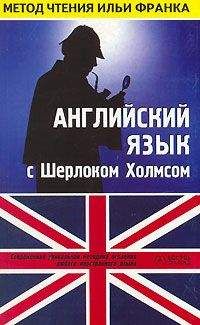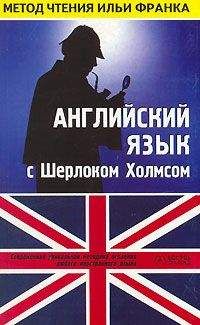"Whatever have you been doing with yourself, Watson (что это ты с собой сделал, Ватсон)?" he asked in undisguised wonder (спросил он с нескрываемым удивлением; to disguise — утаивать, скрывать), as we rattled through the crowded London streets (пока мы громыхали по запруженным лондонским улицам; to rattle — грохотать; дребезжать; сильно стучать; crowd — толпа; crowded — переполненный). "You are as thin as a lath and as brown as a nut (ты худой, как щепка, и загорелый, как орех; lath — планка, рейка; brown — смуглый; загорелый)."
I gave him a short sketch of my adventures (я кратко описал мои приключения; to give —давать; sketch — описание в общих чертах), and had hardly concluded it by the time that we reached our destination (и едва успел закончить, как: «к тому времени, когда» мы добрались до цели нашей поездки; destination — место назначения).
conclusion [ [email protected]'klu:Z(@)n], sight [saIt], pleasant [pleznt], disguise [dIs'gaIz], wonder [' [email protected]]
On the very day that I had come to this conclusion, I was standing at the Criterion Bar, when some one tapped me on the shoulder, and turning round I recognized young Stamford, who had been a dresser under me at Barts. The sight of a friendly face in the great wilderness of London is a pleasant thing indeed to a lonely man. In old days Stamford had never been a particular crony of mine, but now I hailed him with enthusiasm, and he, in his turn, appeared to be delighted to see me. In the exuberance of my joy, I asked him to lunch with me at the Holborn, and we started off together in a hansom.
"Whatever have you been doing with yourself, Watson?" he asked in undisguised wonder, as we rattled through the crowded London streets. "You are as thin as a lath and as brown as a nut."
I gave him a short sketch of my adventures, and had hardly concluded it by the time that we reached our destination.
"Poor devil!" he said, commiseratingly (бедолага: «бедный дьявол», — сказал он сочувствующе; misery — страдание; to commiserate — сочувствовать), after he had listened to my misfortunes (выслушав /рассказ о/ моих злоключениях; fortune — счастье, удача). "What are you up to now (и что ты собираешься делать теперь; to be up to — замышлять что-то, собираться сделать)?"
"Looking for lodgings," I answered (ищу квартиру, — ответил я; to look — смотреть; to look for — искать; to lodge — обеспечивать временным жильем; сдавать квартиры внаем; lodgings — сдаваемая комната, квартира). "Trying to solve the problem as to whether it is possible to get comfortable rooms at a reasonable price (пытаюсь выяснить: «решить проблему», возможно ли найти: «получить» удобную квартиру за разумную цену; whether — ли, вводит придаточные предложения, выражающие неуверенность или выбор из нескольких вариантов; room — комната; rooms — жилище; помещение; квартира)."
"That's a strange thing," remarked my companion (странно: «странная вещь», — заметил мой компаньон); "you are the second man to-day that has used that expression to me (ты второй человек сегодня, от которого я слышу эту фразу: «который использовал это выражение /обращаясь/ ко мне»)."
"And who was the first?" I asked (а кто был первым, — спросил я).
"A fellow who is working at the chemical laboratory up at the hospital (парень, который работает в химической лаборатории при госпитале). He was bemoaning himself this morning (он сетовал: «оплакивал себя» сегодня утром; to bemoan — оплакивать, стенать, горевать) because he could not get someone to go halves with him in some nice rooms (что он не может найти себе компаньона снимать на двоих хорошенькую квартирку: «потому что он не мог заполучить кого-нибудь поделить расходы поровну в какой-то хорошенькой квартире»; to go halves — делить расходы пополам с кем-нибудь) which he had found, and which were too much for his purse (которую он нашел и которая слишком обременительна для его кошелька /чтобы снимать ее одному/: «которая слишком много для его кошелька»; to find — находить)."
said [sed], commiseratingly [ [email protected], [email protected]'reItINlI], listen ['lIs(@)n], misfortune [mIs'fO:tS(@)n], chemical ['kemIk(@)l], laboratory [ [email protected]' [email protected](@)rI]
"Poor devil!" he said, commiseratingly, after he had listened to my misfortunes. "What are you up to now?"
"Looking for lodgings," I answered. "Trying to solve the problem as to whether it is possible to get comfortable rooms at a reasonable price."
"That's a strange thing," remarked my companion; "you are the second man to-day that has used that expression to me."
"And who was the first?" I asked.
"A fellow who is working at the chemical laboratory up at the hospital. He was bemoaning himself this morning because he could not get someone to go halves with him in some nice rooms which he had found, and which were too much for his purse."
"By Jove!" I cried (да ты что! — вскричал я; Jove — бог Юпитер; by Jove — клянусь Юпитером, восклицание, выражающее удивление, досаду и т.п.), "if he really wants someone to share the rooms and the expense (если ему в самом деле нужен кто-то: «если он в самом деле хочет кого-то», чтобы на двоих снимать квартиру и делить расходы; to share — разделять; использовать совместно; expense — расход, издержки), I am the very man for him (я самый подходящий человек для него; very — тот самый; именно тот). I should prefer having a partner to being alone (я бы предпочел делить квартиру с кем-то, чем жить одному: «я бы предпочел иметь партнера пребыванию в одиночестве»)."
Young Stamford looked rather strangely at me over his wine-glass (молодой Стемфорд довольно странно посмотрел на меня поверх бокала; wine — вино; glass — стакан, бокал). "You don't know Sherlock Holmes yet," he said (ты еще не знаешь Шерлока Холмса, — сказал он); "perhaps you would not care for him as a constant companion (возможно, тебе не захочется иметь его в качестве постоянного компаньона; to care — иметь желание)."
"Why, what is there against him (почему, с ним что-то не так: «что есть против него»)?"
"Oh, I didn’t say there was anything against him (ну, я не сказал, что с ним что-то не так: «что есть что-нибудь против него». He is a little queer in his ideas — an enthusiast in some branches of science (у него несколько странные идеи: «он немного странен в своих идеях» — /он/ энтузиаст в определенных отраслях науки; queer — странный, необычный, чудной; branch — ветвь; ответвление; отрасль). As far as I know he is a decent fellow enough (насколько я знаю, он довольно неплохой парень; decent — приличный, порядочный; скромный; славный, хороший; неплохой)."
"A medical student, I suppose (студент-медик, я полагаю)?" said I.
expense [Iks'pens], queer [ [email protected]], enthusiast [In'Tju:zI&st], science [' [email protected]], enough [I'nVf]
"By Jove!" I cried, "if he really wants someone to share the rooms and the expense, I am the very man for him. I should prefer having a partner to being alone."
Young Stamford looked rather strangely at me over his wine-glass. "You don't know Sherlock Holmes yet," he said; "perhaps you would not care for him as a constant companion."
"Why, what is there against him?"
"Oh, I didn't say there was anything against him. He is a little queer in his ideas — an enthusiast in some branches of science. As far as I know he is a decent fellow enough."
"A medical student, I suppose?" said I.
"No — I have no idea what he intends to go in for (нет, я не имею ни малейшего представления, чем он намеревается заниматься; to go in for — избрать в качестве основного занятия или хобби; интересоваться, увлекаться). I believe he is well up in anatomy (я считаю, что он довольно прилично разбирается в анатомии; to be well up — быть сведущим, хорошо осведомленным), and he is a first-class chemist (и он первоклассный химик); but, as far as I know, he has never taken out any systematic medical classes (но, насколько я знаю, он никогда систематически не изучал медицину: «никогда не проходил систематического курса по медицине»; to take — брать; получать, усваивать; class — занятие, урок; курс обучения, курс лекций). His studies are very desultory and eccentric (то, что он изучает, кажется чрезвычайно бессистемным и порой эксцентричным: «его учеба очень бессистемна и экстравагантна»; study — изучение, исследование; studies — учеба, приобретение знаний; desultory — несвязный, отрывочный; несистематический; eccentric — эксцентричный; необычный; экстравагантный), but he has amassed a lot of out-of-the-way knowledge which would astonish his professors (но он собрал массу необычных сведений, которые удивили бы его профессоров; to amass — собирать; копить; out-of-the-way — необычный, странный)."
"Did you never ask him what he was going in for?" I asked (а ты никогда не спрашивал его, чем он занимается, — спросил я).
"No; he is not a man that it is easy to draw out (нет, он не тот человек, которого легко разговорить; to draw — тащить; тянуть; to draw out — вытащить наружу; вызывать на разговор; выпытывать), though he can be communicative enough when the fancy seizes him (хотя он может быть достаточно общительным в соответствующем настроении: «когда такая прихоть охватит его»; fancy — каприз, прихоть, причуда; to seize — схватить, хватать; охватить; завладевать)."
chemist ['kemIst], systematic [, [email protected]'m&tIk], desultory ['des(@)lt(@)rI], eccentric [Ik'sentrIk], knowledge ['nOlIdZ], draw [drO:], seize [si:z]
"No — I have no idea what he intends to go in for. I believe he is well up in anatomy, and he is a first-class chemist; but, as far as I know, he has never taken out any systematic medical classes. His studies are very desultory and eccentric, but he has amassed a lot of out-of-the way knowledge which would astonish his professors."
"Did you never ask him what he was going in for?" I asked.
"No; he is not a man that it is easy to draw out, though he can be communicative enough when the fancy seizes him."
"I should like to meet him (мне бы хотелось повстречаться с ним)," I said. "If I am to lodge with anyone, I should prefer a man of studious and quiet habits (если уж мне предстоит снимать комнату с кем-нибудь, я бы предпочел человека прилежного и тихих привычек: «человека прилежных и тихих привычек»; to lodge — квартировать; снимать комнату; studious — прилежный, старательный, трудолюбивый). I am not strong enough yet to stand much noise or excitement (я еще недостаточно окреп, чтобы переносить много шума или волнения; strong — крепкий, здоровый; to stand — выдерживать, выносить). I had enough of both in Afghanistan to last me for the remainder of my natural existence (я перенес достаточно и того, и другого: «я имел достаточно обоих» в Афганистане, чтобы мне хватило до конца моей бренной жизни: «естественного существования»; to last — хватать, быть достаточным; remainder — остаток; оставшаяся часть). How could I meet this friend of yours (как бы мне встретить этого вашего друга)?"



